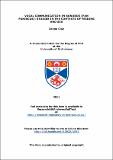Vocal communication in bonobos (Pan paniscus) : studies in the contexts of feeding and sex
Abstract
Despite having being discovered nearly 80 years ago, bonobos (Pan paniscus) are still one of the least well understood of the great apes, largely remaining in the shadow of their better known cousins, the chimpanzees (Pan troglodytes). This is especially evident in the domain of communication, with bonobo vocal behaviour still a
neglected field of study, especially compared to that of chimpanzees. In this thesis, I address this issue by exploring the natural vocal communication of bonobos and its underlying cognition, focusing on the role that vocalisations play during two key contexts, food discovery and sex. In the context of food-discovery, I combine
observational and experimental techniques to examine whether bonobos produce and understand vocalisations that convey meaningful information about the quality of
food encountered by the caller. Results indicate that bonobos produce an array of vocalisations when finding food, and combine different food-associated calls together into sequences in a way that relates to perceived food quality. In a subsequent playback study, it was demonstrated that receivers are able to extract meaning about perceived food quality by attending to these calls and integrating information across call sequences. In the context of sexual interactions, I examine the acoustic structure of female copulation calls, as well as patterns in call usage, to explore how these signals are used by individuals. My results show that females emit copulation calls in similar ways with both male and female partners, suggesting that these signals have become partly divorced from a function in reproduction, to assume a greater social role. Overall, my results highlight the relevance of studying primate vocalisations to investigate the underlying cognition and suggest that vocalisations are important behavioural tools for bonobos to navigate their social and physical worlds.
Type
Thesis, PhD Doctor of Philosophy
Collections
Items in the St Andrews Research Repository are protected by copyright, with all rights reserved, unless otherwise indicated.

